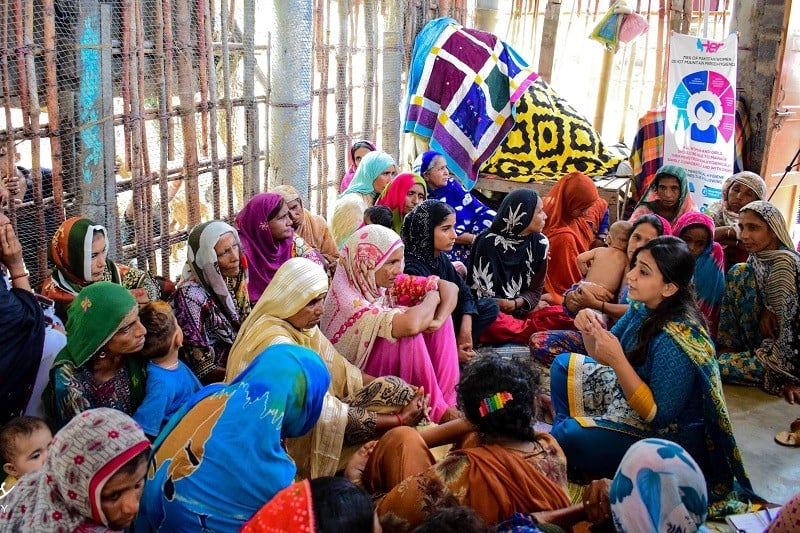
An NGO founded by two sisters is helping take the shame away from natural functions of young female bodies

When Sana Lokhandwala and Sumaira Lokhandwala of HER Pakistan arrived, the seminar room at Shaheed Mohatarma Benazir Bhutto Trauma Centre was full of curious women belonging to different departments of the institution, This isn’t the first drive held by HER Pakistan, an organization founded by the sister duo in May 2018, with the aim to raise awareness about menstrual hygiene in underprivileged parts of different cities, under the slogan ‘Ending Period Poverty’.
After a quick ice-breaking session, Sumaira asked the women gathered about their experiences of having periods. Many said periods had become a part of their lives so they just dealt with them, but one said that she could not wait for old age to get rid of them. Following this, the women were given all the appropriate information about periods and the transformation of a woman’s body during puberty. The focus was on menstrual management, puberty and associated physical, emotional and behavioral changes. Notions and fallacies surrounding the discharge of blood were clarified. It was explained to the women that the blood gets passed out of the body when the egg isn’t fertilized in the uterus.
Breaking down some of the myths, Sumaira, who has an MBA in health and hospital management, asked the audience about ‘dos’ and don’ts’ during periods. Many women unanimously agreed that drinking cold water was a big no while some of them staunchly believed in not taking a bath during the cycle. "I have been told by a lady doctor that drinking cold water during periods can lead to cramps," Nasreen, a lady in the room stated. She was told in response that cramps vary in women due to different reasons but consuming cold water had no relation to it. Another participant said that taking a bath should be avoided because water can enter the body through the vagina, leading to its swelling. Sumaira debunked this by explaining to the participant that the vagina does not expand during periods, thus water cannot enter the body through it on any given day, thanks to the way human anatomy is shaped.
Knowing that many women use cloth rather than sanitary towels due to cost, Sumaira didn’t discourage the practice. She advised the women to wash the cloth they use properly, dry it under direct sunlight and iron it before the next use to make sure that it doesn’t breed any infections.
HER Pakistan came into being after the Lokhandwala sisters realized that majority of the women living in impoverished areas have little to no knowledge about menstrual hygiene owing to lack of access to facilities. Even the privileged shy away from a discussion on menstrual health, therefore it is important to educate all kinds of women about their periods so that they can manage them better.
"Women who do not have access to clean water are the ones who face immense problems because their day-to-day lives get affected by this lack. The idea of this initiative was to provide them with a safe space where they can discuss their problems without the fear of being judged," said Sana. Explaining the idea further, Sumaira said that it was about making education about women’s bodies more accessible to those women who have don’t have enough sources of knowledge.
Most of the girls HER Pakistan approaches do not even go to school. During the awareness sessions, talks take place regarding the different ways of hygienic management of period blood, which is not only restricted to the use of pads. However, a month’s supply of sanitary pads is provided to these women to give them practice of a product that they may not be aware of, hence opening more options for them. A free monthly supply of pads is not sustainable but education on the matter definitely is.
"HER Pakistan does not solely target schools or colleges. We go to the heart of communities and meet women and girls of all ages and backgrounds in their comfort zones. They don’t need to go to school to learn about menstruation, we are taking that information to them. During our sessions, we teach healthy management of period blood and remove the aspect of shame from the natural phenomenon," she points out. "This enables girls and women to feel more confident about their bodies during menstruation and reduces the chances of missing out on school days and work," she says. Of course, there are other reasons as well. Lack of clean water and proper washrooms in schools also become one of the major reasons why girls miss school during their period.
HER Pakistan has received tremendous response from women all across the country, with over 100 volunteers who are increasing with each drive. With the help of a team of volunteers, HER Pakistan has been able to hold many drives since its launch in the areas of Old Golimar, Machar Colony, Rehri Goth and SMBB Trauma Centre in Karachi. The organization is open to donations in the form of pads as well as money. Their most recent drive was in collaboration with Lyari Girls Café. They are now vying for the OxFam Young Humanitarian Award.
The sisters also plan on reaching women in the rural areas of Sindh and hope to target the entire country to let all women know that periods are natural and women can be empowered if they are given information about the autonomy of their body.